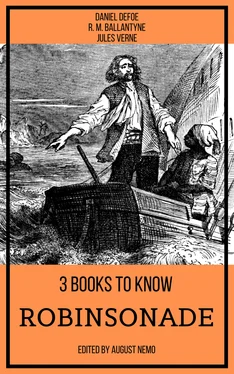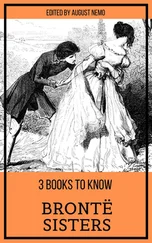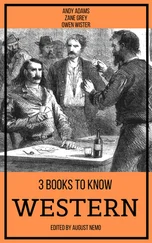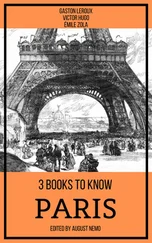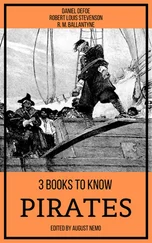“The court-jester,” interrupted Jack.
“No,” retorted Peterkin; “I’ll have no title at all. I shall merely accept a highly responsible situation under government; for you see, Jack, I’m fond of having an enormous salary and nothing to do.”
“But suppose there are no natives?”
“Then we’ll build a charming villa, and plant a lovely garden round it, stuck all full of the most splendiferous tropical flowers; and we’ll farm the land, plant, sow, reap, eat, sleep, and be merry.”
“But to be serious,” said Jack, assuming a grave expression of countenance — which, I observed, always had the effect of checking Peterkin’s disposition to make fun of everything —“we are really in rather an uncomfortable position. If this is a desert island, we shall have to live very much like the wild beasts; for we have not a tool of any kind — not even a knife.”
“Yes, we have that,” said Peterkin, fumbling in his trousers pocket, from which he drew forth a small penknife with only one blade, and that was broken.
“Well, that’s better than nothing. — But come,” said Jack, rising; “we are wasting our time in talking instead of doing. — You seem well enough to walk now, Ralph. — Let us see what we have got in our pockets; and then let us climb some hill and ascertain what sort of island we have been cast upon, for, whether good or bad, it seems likely to be our home for some time to come.”
WE EXAMINE INTO OUR Personal Property, and Make a Happy Discovery — Our Island Described — Jack Proves Himself to Be Learned and Sagacious Above His Fellows — Curious Discoveries — Natural Lemonade!

WE NOW SEATED OURSELVES upon a rock, and began to examine into our personal property. When we reached the shore after being wrecked, my companions had taken off part of their clothes and spread them out in the sun to dry; for although the gale was raging fiercely, there was not a single cloud in the bright sky. They had also stripped off most part of my wet clothes and spread them also on the rocks. Having resumed our garments, we now searched all our pockets with the utmost care, and laid their contents out on a flat stone before us; and now that our minds were fully alive to our condition, it was with no little anxiety that we turned our several pockets inside out in order that nothing might escape us. When all was collected together, we found that our worldly goods consisted of the following articles:
First, a small penknife with a single blade, broken off about the middle and very rusty, besides having two or three notches on its edge. (Peterkin said of this, with his usual pleasantry, that it would do for a saw as well as a knife, which was a great advantage.) Second, an old German-silver pencil-case without any lead in it. Third, a piece of whip-cord about six yards long. Fourth, a sailmaker’s needle of a small size. Fifth, a ship’s telescope, which I happened to have in my hand at the time the ship struck, and which I had clung to firmly all the time I was in the water; indeed, it was with difficulty that Jack got it out of my grasp when I was lying insensible on the shore. I cannot understand why I kept such a firm hold of this telescope. They say that a drowning man will clutch at a straw. Perhaps it may have been some such feeling in me, for I did not know that it was in my hand at the time we were wrecked. However, we felt some pleasure in having it with us now — although we did not see that it could be of much use to us, as the glass at the small end was broken to pieces. Our sixth article was a brass ring which Jack always wore on his little finger. I never understood why he wore it; for Jack was not vain of his appearance, and did not seem to care for ornaments of any kind. Peterkin said, “it was in memory of the girl he left behind him!” But as he never spoke of this girl to either of us, I am inclined to think that Peterkin was either jesting or mistaken. In addition to these articles, we had a little bit of tinder and the clothes on our backs. These last were as follows:
Each of us had on a pair of stout canvas trousers and a pair of sailors’ thick shoes. Jack wore a red flannel shirt, a blue jacket, and a red Kilmarnock bonnet or nightcap, besides a pair of worsted socks, and a cotton pocket-handkerchief with sixteen portraits of Lord Nelson printed on it and a union-jack in the middle. Peterkin had on a striped flannel shirt — which he wore outside his trousers and belted round his waist, after the manner of a tunic — and a round black straw hat. He had no jacket, having thrown it off just before we were cast into the sea; but this was not of much consequence, as the climate of the island proved to be extremely mild — so much so, indeed, that Jack and I often preferred to go about without our jackets. Peterkin had also a pair of white cotton socks and a blue handkerchief with white spots all over it. My own costume consisted of a blue flannel shirt, a blue jacket, a black cap, and a pair of worsted socks, besides the shoes and canvas trousers already mentioned. This was all we had, and besides these things we had nothing else; but when we thought of the danger from which we had escaped, and how much worse off we might have been had the ship struck on the reef during the night, we felt very thankful that we were possessed of so much, although, I must confess, we sometimes wished that we had had a little more.
While we were examining these things and talking about them, Jack suddenly started and exclaimed:
“The oar! We have forgotten the oar!”
“What good will that do us?” said Peterkin. “There’s wood enough on the island to make a thousand oars.”
“Ay, lad,” replied Jack; “but there’s a bit of hoop-iron at the end of it, and that may be of much use to us.”
“Very true,” said I; “let us go fetch it.” And with that we all three rose and hastened down to the beach. I still felt a little weak from loss of blood, so that my companions soon began to leave me behind; but Jack perceived this, and, with his usual considerate good-nature, turned back to help me. This was now the first time that I had looked well about me since landing, as the spot where I had been laid was covered with thick bushes, which almost hid the country from our view. As we now emerged from among these and walked down the sandy beach together, I cast my eyes about, and truly my heart glowed within me and my spirits rose at the beautiful prospect which I beheld on every side. The gale had suddenly died away, just as if it had blown furiously till it dashed our ship upon the rocks, and had nothing more to do after accomplishing that. The island on which we stood was hilly, and covered almost everywhere with the most beautiful and richly coloured trees, bushes, and shrubs, none of which I knew the names of at that time — except, indeed, the cocoa-nut palms, which I recognised at once from the many pictures that I had seen of them before I left home. A sandy beach of dazzling whiteness lined this bright-green shore, and upon it there fell a gentle ripple of the sea. This last astonished me much, for I recollected that at home the sea used to fall in huge billows on the shore long after a storm had subsided. But on casting my glance out to sea the cause became apparent. About a mile distant from the shore I saw the great billows of the ocean rolling like a green wall, and falling with a long, loud roar upon a low coral reef, where they were dashed into white foam and flung up in clouds of spray. This spray sometimes flew exceedingly high, and every here and there a beautiful rainbow was formed for a moment among the falling drops. We afterwards found that this coral reef extended quite round the island, and formed a natural breakwater to it. Beyond this, the sea rose and tossed violently from the effects of the storm; but between the reef and the shore it was as calm and as smooth as a pond.
Читать дальше
